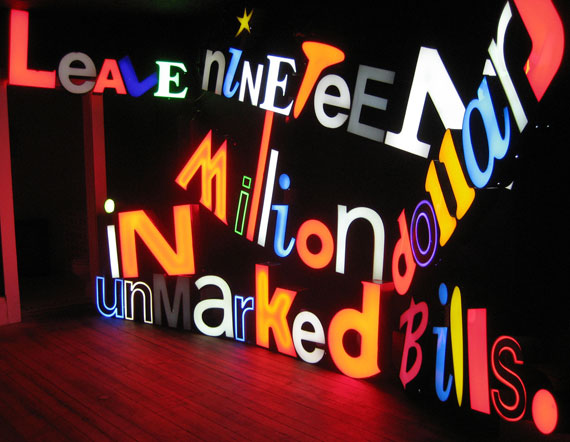Entries by Michael Atkins (1064)
Does Artist Have Trademark Claim Against Bar Influenced by His Work?

The Slog raises an interesting issue. A local bar is about to open that reportedly was influenced by a work called “Ransom Note” by Seattle neon artist Jeremy Bert. The work spells out the words “Leave Nineteen Million Dollars in Unmarked Bills” (pictured above). The bar commissioned a ransom-note painting and has dubbed itself “Nine Million in Unmarked Bills.” The Slog says this has left Mr. Bert less than happy.
The Slog asks, “What does the bar owner owe the artist?” I’ll re-frame the question to focus on trademark law. Any trademark law problem here?
Not from where I sit. If the artist raised a trademark claim, I don’t think it would get off the ground because I don’t think Mr. Bert has any trademark rights. In the United States, one generally gets trademark rights by using a mark, which means affixing the mark to a good (or using it in connection with a service) and selling the good or service to a third party. Since all Mr. Bert has done is create an installation (no matter how creative the installation is), he wouldn’t seem to have acquired any trademark rights in the words incorporated in his work.
I’ll leave the closer copyright issue to a copyright blogger, like Seattle’s Copyright or Wrong.
Photo credit: Lele Barnett
Allied Sues Allied Over ALLIED

On May 19, Spokane-based Allied Safe & Vault Co., Inc., filed suit in the Eastern District against Otis Orchards-based Allied Fire Sprinklers, Inc., alleging that defendant’s use of “Allied” infringes plaintiff’s registered trademarks for ALLIED FIRE & SECURITY.
Tomorrow’s post: Acme Sues Acme Over ACME.
Fantastic Sams and Regis Settle Western District Trademark Dispute


Last May, Fantastic Sams Franchise Corporation filed a trademark infringement case in the Western District against Regis Corporation. It alleged that Regis converted several Seattle-area FANTASTIC SAMS salons into its own HAIRMASTER salons and caused a likelihood of consumer confusion when it failed to remove all of the FANTASTIC SAMS trademarks from the premises.
On May 29, the parties filed a Stipulation and Order of Dismissal dismissing with prejudice all claims and counterclaims against each other.
The case cite is Fantastic Sams Franchise Corp. v. Regis Corp., No 08-706 (W.D. Wash.).
Expedia and Hotels.com Sue Priceline.com for False Advertising

On May 20, Bellevue-based Expedia, Inc. and Hotels.com, L.P. filed suit in the Western District against rival travel seller Priceline.com Inc. for false advertising. Plaintiffs claim Priceline.com “makes the unqualified claim that consumers can save ‘half off’ or ‘up to half off’ hotel prices with Priceline compared to Expedia and Hotels.com,” which they allege is false and misleading to consumers.
Plaintiffs assert that Priceline.com offers both a “fixed-price” service in which consumers know the identities of the hotels offered, prices, and availability, as well as a “blind-bidding” service in which consumers do not know the identities of the hotels offered, prices, or availability. Plaintiffs allege Priceline.com’s “blind-bidding” service is the only one that may enable consumers to achieve the advertised savings.
In plaintiffs’ words: “Notwithstanding the material and fundamental differences between Priceline’s ‘fixed-price’ service, and it’s ‘blind-bidding’ service, Priceline deliberately blurs the distinction between its two very different services on its website and in its advertising in order to mislead consumers into believing that they can achieve the advertised savings with any hotel reservation on the Priceline website when in fact the advertised savings are available, if at all, only on Priceline’s ‘blind-bidding’ service. Indeed, because Priceline’s website features both fixed-price and ‘blind-bidding’ services, Priceline’s unqualified price savings claims are false and misleading.”
Priceline.com has not yet answered plaintiffs’ complaint.
Priceline.com’s Web site states: “Priceline’s Name Your Own Price® reservation service is different from fixed-price travel sites like Hotels.com and Expedia.com. With Priceline’s Name Your Own Price® reservation service, the exact hotel is shown only after purchase. Percent savings claim above applies to Name Your Own Price® hotel purchases only and are as compared to the published prices shown on Hotels.com and Expedia.com for the same hotels and the same dates.”
The case cite is Expedia, Inc. v. Priceline.com Inc., No. 09-712 (W.D. Wash.).
Western District Dismisses Defendant in Rockin' Perfume Trademark Dispute
As discussed here, Sportsfragrance, Inc., sued The Perfumer’s Workshop International, Ltd., in the Western District for trademark infringement. The crux of the dispute was Sportsfragrance’s allegation that Perfumer’s use of ROCK & ROLL in connection with its perfumes infringes Sportsfragrance’s ROCK ‘N ROLL mark in connection with perfumes.
Perfumer’s (PWI) filed a motion to dismiss for lack of personal jurisdiction. In response, Sportsfragrance argued that Perfumer’s purposefully availed itself to Washington by selling its SAMBA ROCK & ROLL perfumes through Target’s and Perfumania’s online stores that are accessible in Washington and by selling other perfumes through those stores’ physical locations in Washington.
Judge Thomas Zilly found these activities weren’t enough for purposeful availment.
“For purposes of determining personal jurisdiction, the Court finds that PWI placed the allegedly infringing Samba ROCK & ROLL perfume products in the stream of commerce by selling it to Minnesota-based Target and New York-based Quality King Fragrance, Inc. However, even though it may have been foreseeable that these third [party] retailers would, in turn, market and sell the product elsewhere in the country, and perhaps in Washington, foreseeability alone is an insufficient basis for the Court to exercise personal jurisdiction over PWI. It is a defendant’s conduct and the connection with the forum state that are crucial to the personal jurisdiction analysis. Thus, even if the Court accepts as true Sportsfragrance’s uncontroverted allegation that retailers sold the allegedly infringing Samba ROCK & ROLL perfume products in Washington, despite the lack of evidence in support of such an allegation, that fact does not go to PWI’s activities in Washington. Sportsfragrance has failed to make a prima facie showing of purposeful availment as to PWI.”
On May 15 the court dismissed all claims against Perfumer’s and ordered it to file any motion for fees and costs pursuant to Washington’s long-arm statute within ten days.
The case cite is Sportsfragrance, Inc. v. The Perfumer’s Workshop International, Ltd., 2009 WL 1393864, No. 09-177 (W.D. Wash. May 15, 2009) (Zilly, J).
Disclaimer: My firm happily represented Perfumer’s in this case.